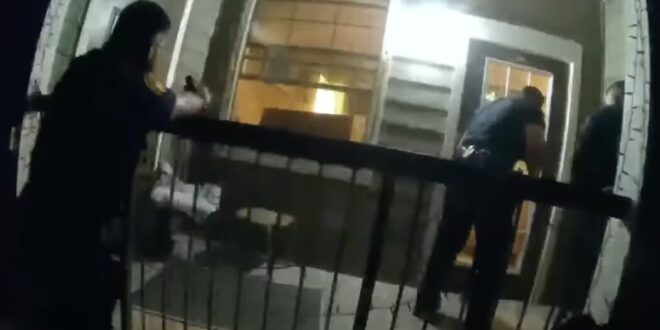San Antonio Police Department’s Failure in Responding to Mental Health Crisis Calls
The San Antonio Police Department, like many other police departments across the country, has a dedicated Mental Health Unit that provides trained and empathetic responses to calls involving individuals in distress. However, a recent incident involving the shooting and killing of Melissa Perez, a woman diagnosed with schizophrenia, has shed light on the department’s failings in addressing mental health issues.
The police were called to Ms. Perez’s apartment complex after reports that she was cutting fire alarm wires outside her apartment. When officers arrived at the scene, Ms. Perez exhibited unusual behavior and claimed that the FBI was spying on her through the alarm. Instead of calling the Mental Health Unit, the officers attempted to get her into their car, leading her to run into her apartment and lock the door.
Inside her apartment, Ms. Perez engaged in an argument with the officers from behind a window. She threw a glass candlestick and later grabbed a hammer, swinging it toward the officers. In response, three officers shot into her apartment, hitting her multiple times. All three officers were charged with murder, emphasizing the severity of the situation.
Chief William McManus of the San Antonio Police Department acknowledged that the Mental Health Unit was not called in this instance, despite being available around the clock. He described it as a failure on the part of the sergeant at the scene. However, this incident raises larger concerns about police staffing, training, decision-making, and handling of individuals experiencing mental health issues.
A Need for Reform
Local activists, such as Edward Piña, former president of the San Antonio branch of the A.C.L.U., contend that Ms. Perez’s death is not an isolated incident but rather indicative of a longstanding problem in how the police department deals with individuals exhibiting psychiatric symptoms. They argue that far too many individuals with mental health issues end up dead due to improper restraints or unwarranted use of force.
Although the San Antonio Police Department established its Mental Health Unit in 2008 and has since expanded its manpower to 20 sworn members, the unit’s response to mental health crisis calls remains limited. From January 2019 to April 2021, the department received over 54,000 mental health calls, but only a small fraction of those calls involved the Mental Health Unit.
The Meadows Mental Health Policy Institute, in a 2021 report, criticized the department for its law-enforcement-driven response to mental health issues. Despite its crisis intervention training programs, the department lacks prevention, intervention, and community connections to care. The primary skill set of officers, even those trained in crisis intervention, remains law enforcement.
Chief McManus acknowledges the need for more members in the Mental Health Unit, but he believes the response of the current officers has been adequate. He also highlights the department’s year-old program that sends a mental health clinician, a paramedic, and a police officer to respond to mental health 911 calls within a specific service area.
The lawsuit filed by Ms. Perez’s family against the city and the three officers cites other cases in which the Mental Health Unit was not summoned or failed to respond to calls involving mental health concerns. They argue that the entire response to Ms. Perez and the failure to de-escalate the situation reflect a department in dire need of systemic reform.
The Aftermath and Call for Change
While the legal resolution of Ms. Perez’s case is ongoing, her family continues to grapple with the aftermath of that fateful night. Her daughter, Alexis Tovar, remembers her mother as a loving and helpful person. However, she now lives with the nightmare of her mother’s death, unable to eat or sleep, and losing trust in the police to protect her.
San Antonio’s Police Department faces significant challenges in effectively responding to mental health crisis calls. While it has received recognition for its work from organizations like the National Alliance on Mental Illness, the size of the Mental Health Unit remains insufficient for a city of San Antonio’s magnitude. There is a pressing need for systemic reform, expanded training, and greater emphasis on prevention, intervention, and community connections to ensure the safety and well-being of individuals experiencing mental health issues.
 Mind Uncharted Explore. Discover. Learn.
Mind Uncharted Explore. Discover. Learn.


